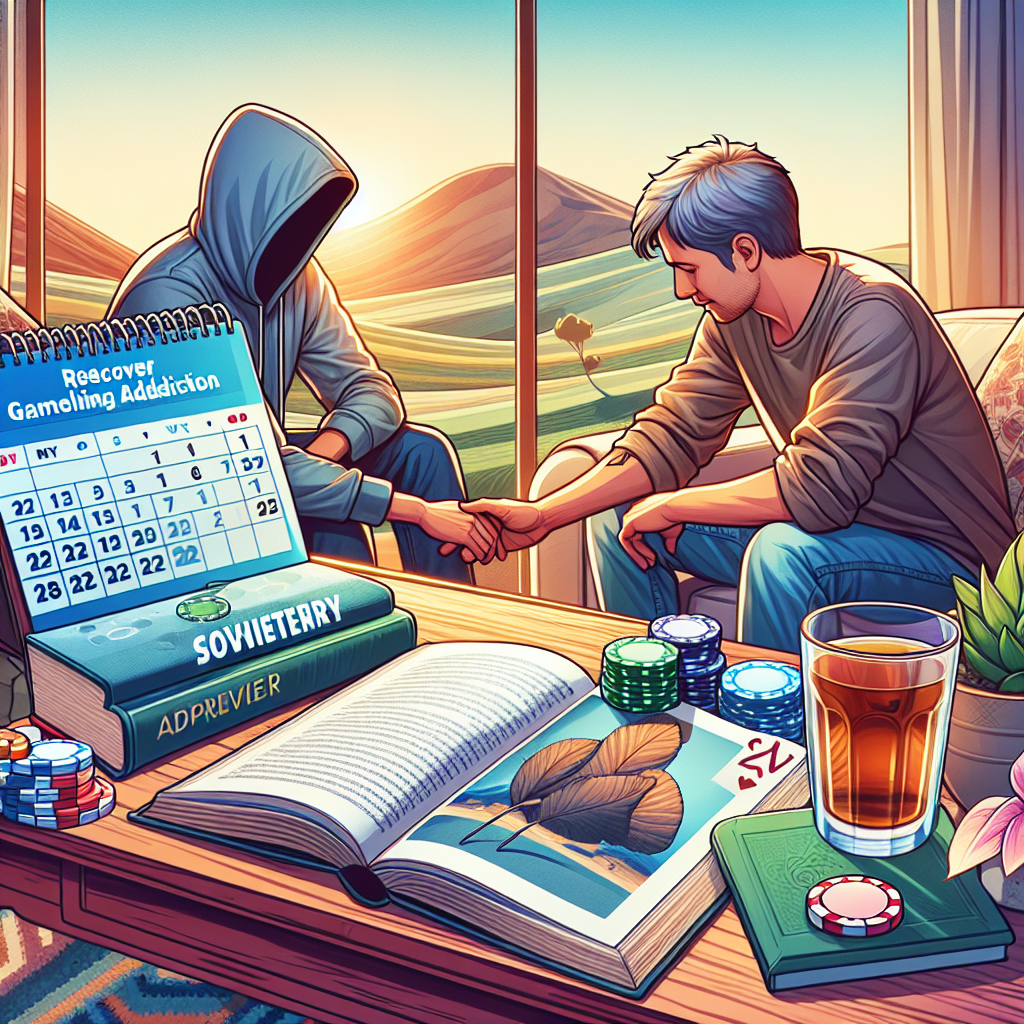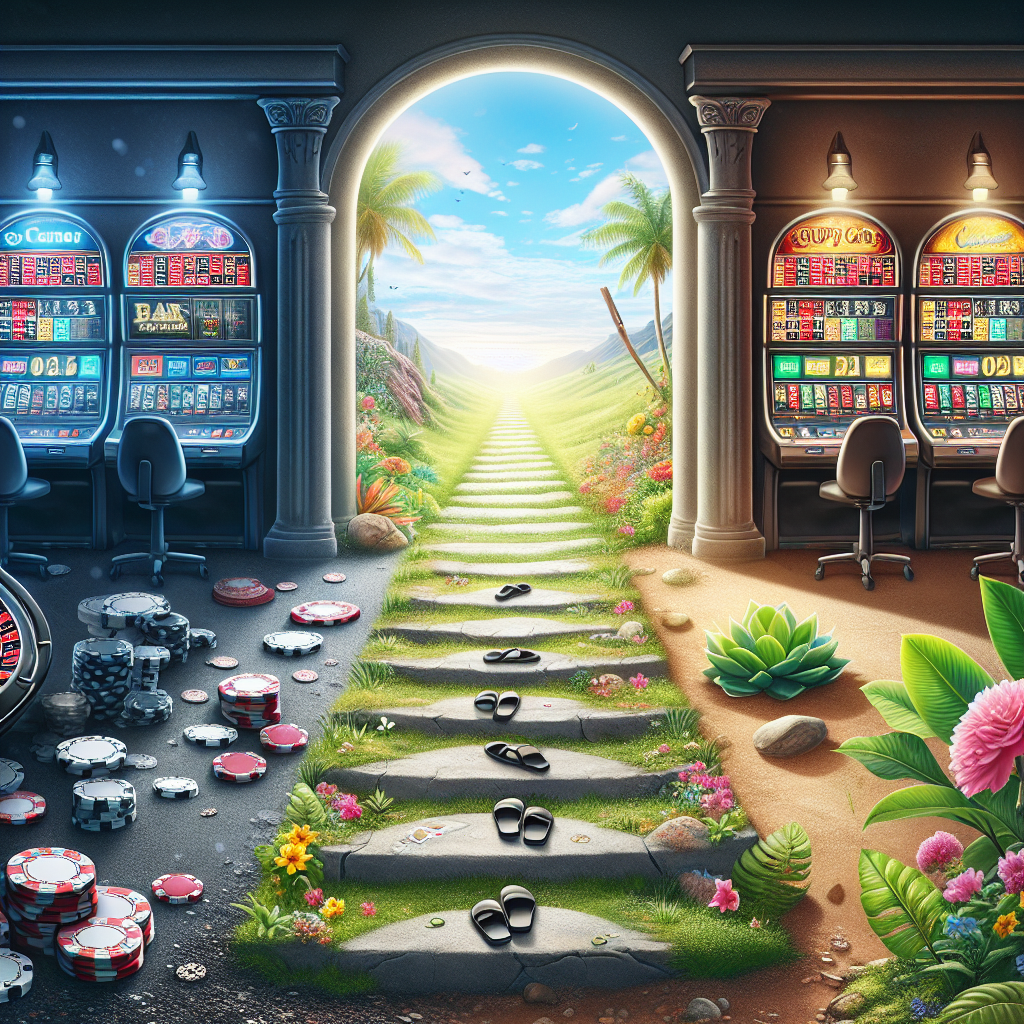-
Table of Contents

“Take the First Step: Reclaim Your Life from Gambling Addiction Today.”
Introduction
Starting your gambling addiction recovery journey involves several crucial steps. First, acknowledge the problem and commit to change. Seek professional help from therapists or counselors specializing in gambling addiction. Join support groups like Gamblers Anonymous to connect with others facing similar challenges. Develop a plan to manage triggers and avoid environments that encourage gambling. Establish healthy routines and hobbies to replace gambling activities. Inform close friends and family about your decision so they can provide support and accountability. Lastly, consider financial counseling to address any monetary issues caused by gambling.
Steps To Begin Your Gambling Addiction Recovery Journey
Embarking on the journey to recover from a gambling addiction can be daunting, but taking the first steps is crucial for reclaiming control over your life. The path to recovery is not linear, and it requires a combination of self-awareness, support, and actionable strategies. To begin, acknowledging the problem is the most significant step. Admitting that gambling has become an issue that negatively impacts your life is a courageous act that sets the foundation for change. This self-awareness allows you to recognize the need for help and opens the door to seeking support.
Once you have acknowledged the problem, the next step is to reach out for support. This can come in many forms, such as confiding in a trusted friend or family member, joining a support group like Gamblers Anonymous, or seeking professional help from a therapist who specializes in addiction. Support groups provide a sense of community and understanding, as you will be surrounded by individuals who share similar experiences and challenges. Professional therapy, on the other hand, can offer personalized strategies and coping mechanisms tailored to your specific situation.
In addition to seeking support, it is essential to educate yourself about gambling addiction. Understanding the psychological and physiological aspects of addiction can empower you to make informed decisions about your recovery. Knowledge about triggers, the impact of gambling on the brain, and the cycle of addiction can help you develop strategies to avoid relapse. Many resources are available online, in books, and through counseling services that can provide valuable insights into the nature of gambling addiction.
Creating a plan for recovery is another critical step. This plan should include setting clear, achievable goals and identifying potential obstacles. For instance, you might set a goal to avoid gambling establishments or online gambling sites. To achieve this, you could implement practical measures such as installing website blockers on your devices or avoiding places where you used to gamble. Additionally, consider developing new hobbies or activities to replace the time and energy previously spent on gambling. Engaging in physical exercise, pursuing creative interests, or volunteering can provide a sense of fulfillment and purpose.
Financial management is also a crucial aspect of recovery. Gambling often leads to financial difficulties, and addressing these issues can alleviate some of the stress associated with addiction. Creating a budget, seeking financial counseling, and finding ways to manage debt are practical steps that can help you regain financial stability. It may also be beneficial to have a trusted person assist you in managing your finances to prevent relapse.
Moreover, practicing self-care and mindfulness can significantly contribute to your recovery journey. Taking care of your physical and mental health through regular exercise, a balanced diet, and sufficient sleep can improve your overall well-being. Mindfulness practices such as meditation and deep-breathing exercises can help you stay present and manage cravings or urges to gamble.
Lastly, it is important to be patient and compassionate with yourself throughout this process. Recovery is a journey with ups and downs, and setbacks are a natural part of it. Celebrate your progress, no matter how small, and remind yourself that each step forward is a victory. Surround yourself with positive influences and continue to seek support when needed.
In conclusion, starting your gambling addiction recovery journey involves acknowledging the problem, seeking support, educating yourself, creating a recovery plan, managing finances, practicing self-care, and being patient with yourself. By taking these steps, you can pave the way towards a healthier, more fulfilling life free from the grips of gambling addiction.
Essential Tips For Starting Your Gambling Addiction Recovery
Embarking on the journey to recover from a gambling addiction can be daunting, but it is a courageous and transformative step towards reclaiming your life. The first essential tip is to acknowledge the problem. Admitting that gambling has become an issue is not a sign of weakness but a powerful act of self-awareness and honesty. This acknowledgment lays the foundation for the recovery process, allowing you to confront the addiction head-on.
Once you have recognized the problem, seeking professional help is crucial. Therapists and counselors who specialize in addiction can provide invaluable support and guidance. Cognitive-behavioral therapy (CBT) is particularly effective in addressing gambling addiction, as it helps you identify and change the thought patterns that drive your behavior. Additionally, support groups such as Gamblers Anonymous offer a sense of community and shared experience, which can be incredibly comforting and motivating.
Another important step is to create a strong support network. Surround yourself with friends and family who understand your struggle and are willing to support you through the ups and downs of recovery. Open communication with your loved ones can help alleviate feelings of isolation and provide a sense of accountability. Moreover, sharing your journey with others can inspire and encourage you to stay committed to your recovery goals.
In addition to professional help and a support network, developing healthy coping mechanisms is essential. Gambling often serves as an escape from stress, boredom, or emotional pain. Finding alternative ways to cope with these feelings can significantly reduce the urge to gamble. Engaging in physical activities, such as exercise or sports, can help release endorphins and improve your mood. Creative outlets like painting, writing, or playing music can also provide a therapeutic escape and a sense of accomplishment.
Financial management is another critical aspect of recovery. Gambling addiction often leads to significant financial strain, which can exacerbate stress and anxiety. Taking control of your finances by creating a budget, paying off debts, and avoiding high-risk financial situations can help you regain a sense of stability and control. Seeking advice from a financial counselor can also provide practical strategies for managing your money and rebuilding your financial health.
Setting realistic and achievable goals is vital for maintaining motivation and tracking progress. Recovery is a gradual process, and it is important to celebrate small victories along the way. Whether it is a week without gambling or successfully managing a triggering situation, acknowledging these accomplishments can boost your confidence and reinforce your commitment to recovery.
Mindfulness and self-care practices can also play a significant role in your journey. Techniques such as meditation, deep breathing exercises, and yoga can help you stay present and manage stress more effectively. Prioritizing self-care by ensuring you get enough sleep, eat a balanced diet, and engage in activities that bring you joy can enhance your overall well-being and resilience.
Lastly, be patient and compassionate with yourself. Recovery is not a linear path, and setbacks are a natural part of the process. Instead of viewing relapses as failures, consider them opportunities to learn and grow. Reflect on what triggered the relapse and develop strategies to handle similar situations in the future. Remember that every step forward, no matter how small, is progress.
In conclusion, starting your gambling addiction recovery journey requires a combination of self-awareness, professional support, a strong support network, healthy coping mechanisms, financial management, goal setting, mindfulness, and self-compassion. By embracing these essential tips, you can pave the way towards a healthier, more fulfilling life free from the grip of gambling addiction.
Q&A
1. **Question:** What is the first step to start my gambling addiction recovery journey?
**Answer:** The first step is to acknowledge that you have a problem and seek professional help, such as contacting a therapist who specializes in addiction or joining a support group like Gamblers Anonymous.
2. **Question:** How can I prevent relapse during my gambling addiction recovery?
**Answer:** To prevent relapse, avoid triggers and high-risk situations, develop healthy coping mechanisms, and maintain a strong support network of friends, family, or support group members.
Conclusion
Starting your gambling addiction recovery journey involves acknowledging the problem, seeking professional help, joining support groups, developing healthy coping mechanisms, and creating a financial plan to manage debts. Establishing a strong support network and setting clear, achievable goals are also crucial steps in maintaining long-term recovery.



